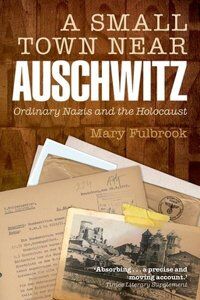Only logged in customers who have purchased this product may leave a review.
Sale!
Small Town Near Auschwitz (Paperback) | Released: 15 Sep 2013
By: Mary Fulbrook (Author) Publisher: Oxford University Press, USA33.00% Off Original price was: ₹ 1,749.00.₹ 1,172.00Current price is: ₹ 1,172.00.
You save ₹ 577.00
The Silesian town of Bedzin lies a mere twenty-five miles from Auschwitz; through the linked ghettos of Bedzin and its neighbouring town, some 85,000 Jews passed on their way to slave labour or the gas chambers. The principal civilian administrator of Bedzin, Udo Klausa, was a happily married family man.... Read More
In stock
Ships within 1-2 Business Days
100% Orginal Books
Easy Replacement
Certified product
Secure Checkout
On time delivery
Author:
Mary Fulbrook
Publisher Name:
Oxford University Press, USA
Language:
English
Binding:
(Paperback)
About The Book
The Silesian town of Bedzin lies a mere twenty-five miles from Auschwitz; through the linked ghettos of Bedzin and its neighbouring town, some 85,000 Jews passed on their way to slave labour or the gas chambers. The principal civilian administrator of Bedzin, Udo Klausa, was a happily married family man. He was also responsible for implementing Nazi policies towards the Jews in his area - inhumane processes that were the precursors of genocide. Yet he later claimed, like so many other Germans after the war, that he had 'known nothing about it'; and that he had personally tried to save a Jew before he himself managed to leave for military service. A Small Town Near Auschwitz re-creates Udo Klausa's story. Using a wealth of personal letters, memoirs, testimonies, interviews and other sources, Mary Fulbrook pieces together his role in the unfolding stigmatization and degradation of the Jews under his authoritiy, as well as the heroic attempts at resistance on the part of some of his victims. She also gives us a fascinating insight into the inner conflicts of a Nazi functionary who, throughout, considered himself a 'decent' man. And she explores the conflicting memories and evasions of his lifeafter the war. But the book is much more than a portrayal of an individual man. Udo Klausa's case is so important because it is in many ways so typical. Behind Klausa's story is the larger story of how countless local functionaries across the Third Reich facilitated the murderous plans of a relatively small number among the Nazi elite - and of how those plans could never have been realized, on the same scale, without the diligent cooperation of these generally very ordinary administrators. As Fulbrook shows, men like Klausa 'knew' and yet mostly suppressed this knowledge, performing their day jobs without apparent recognition of their own role in the system, or any sense of personal wrongdoing or remorse - either before or after 1945. This account is no ordinary historical reconstruction. For Fulbrook did not discover Udo Klausa amongst the archives. She has known the Klausa family all her life. She had no inkling of her subject's true role in the Third Reich until a few years ago, a discovery that led directly to this inescapably personal professional history.About the Author: Mary Fulbrook is Professor of German History at University College London. She has written widely on modern German history, including A Concise History of Germany; A History of Germany 1918-2000: The Divided Nation; German National Identity after the Holocaust; Anatomy of a Dictatorship: Inside the GDR; and The People's State: East German Society from Hitler to Honecker. Her most recent book is Dissonant Lives: Generations and Violence through the German Dictatorships. A fellow of the British Academy, she is former Chair of the German History Society and a member of the Academic Advisory Board of the Foundation for the former Concentration Camps at Buchenwald and Mittelbau-Dora.


Reviews
There are no reviews yet.